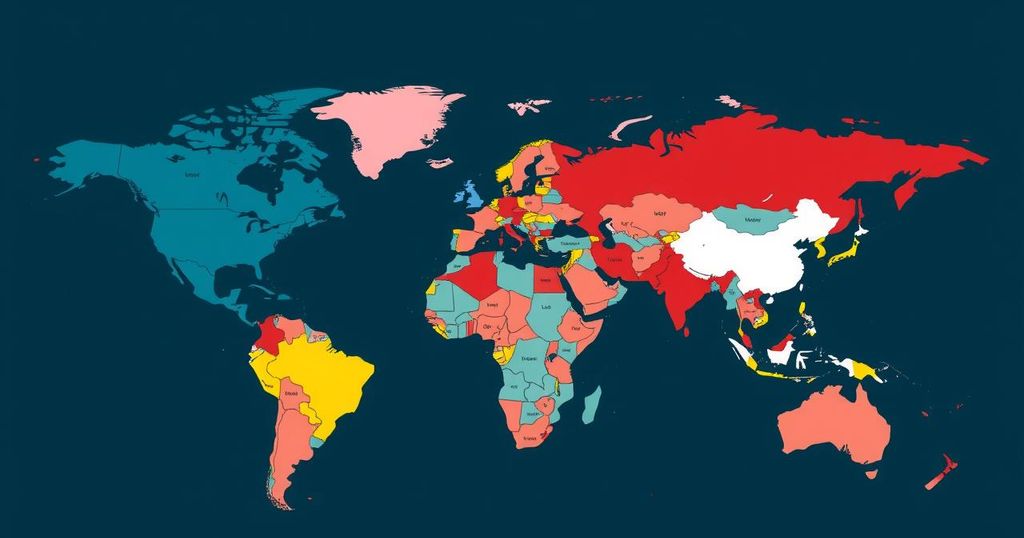Global news
AFRICA, ASIA, CIVILIAN CASUALTIES, CONFLICT, DAVID CARDEN, EUROPE, FAR, FARHAN HAQ, FINDING MISSION, GERMANY, HUMANITARIAN CRISIS, IDLIB, INTERNATIONAL LAW, NEW YORK, NORTH AMERICA, SARC, SOUTH SUDAN, SYRIA, TURKIYE, UN CHILDREN ’ S FUND, UN OFFICE FOR THE COORDINATION OF HUMANITARIAN AFFAIRS, UNHCR, UNITED STATES, WAR CRIMES
Isaac Bennett
0 Comments
Global Crisis Overview: Humanitarian Challenges, Human Rights Accountability, and Electoral Preparations
The article reports on escalating humanitarian crises in Syria due to violence, calls for accountability in Iran for human rights violations during protests, and the preparations for democratic elections in South Sudan, emphasizing the need for civic freedoms and governance reform.
The humanitarian crisis in Syria is worsening amidst ongoing violence, particularly following a recent deadly airstrike at the Ad Dabousiyah border crossing with Türkiye. A Syrian Arab Red Crescent volunteer was among the multiple casualties reported by the UN Office for the Coordination of Humanitarian Affairs (OCHA). The strike not only resulted in civilian deaths but also compelled a suspension of humanitarian operations at border crossings. Heightened violence, notably in Idlib and western Aleppo, has led to numerous injuries, including among children attending school, and has forced various NGOs to halt their activities in the region. Health facilities, schools, and roads have also been affected, prompting urgent calls for the protection of humanitarian workers. Although aid deliveries continue through the Bab Al-Hawa crossing, the situation remains precarious.
In Iran, survivors of the 2022 “Women, Life, Freedom” protests are demanding accountability for human rights abuses resulting from state repression. The Independent International Fact-Finding Mission (FFM) conducted testimonies with over 50 Iranian exiles in Germany, who recounted severe violations, including torture and arbitrary detention. Sara Hossain, Chair of the FFM, highlighted the need for a victim-centered approach to justice, asserting that the voices of the survivors are critical in rallying international support. The FFM emphasized the challenges survivors face in seeking justice within Iran’s oppressive environment while affirming their commitment to advocate for justice both domestically and internationally. A comprehensive report will be submitted to the Human Rights Council in March 2025, offering recommendations on accountability and reparations.
In South Sudan, UNMISS head Nicholas Haysom urged provincial governors to foster civic and political freedoms as the nation approaches its initial democratic elections set for December 2026. During the annual Governors’ Forum in Juba, Mr. Haysom underscored the significance of state leaders in addressing conflict root causes and enabling public engagement in the electoral process. He emphasized the importance of delivering basic services and effective financial management as crucial elements for building trust and sustainable peace in South Sudan. Furthermore, he recommended initiating training for the next group of Necessary Unified Forces to enhance nationwide security prior to the elections.
The humanitarian crisis in Syria has been exacerbated by continuous hostilities, leading to significant civilian distress and disruptions to humanitarian efforts. The situation is complicated by assaults on humanitarian workers and facilities, prompting the UN to call for heightened protections. In Iran, the violent backlash against the 2022 protests has led to widespread calls for justice over human rights abuses, drawing attention to the plight of those enduring state-sanctioned violence. Meanwhile, South Sudan’s political landscape is preparing for democratic elections amid pressing calls for civic freedoms and governance reforms, highlighting the delicate balance between security and participatory governance.
In summary, the current humanitarian challenges in Syria reveal an urgent need for enhanced protections for aid workers amidst ongoing violence. Survivors of human rights violations in Iran underscore the necessity for accountability in the aftermath of the 2022 protests, revealing the complex dynamics of oppression and resistance. Furthermore, the path toward democratic elections in South Sudan requires diligent efforts from provincial governors to ensure civic engagement and address fundamental conflicts, setting the stage for sustainable peace and development.
Original Source: news.un.org




Post Comment